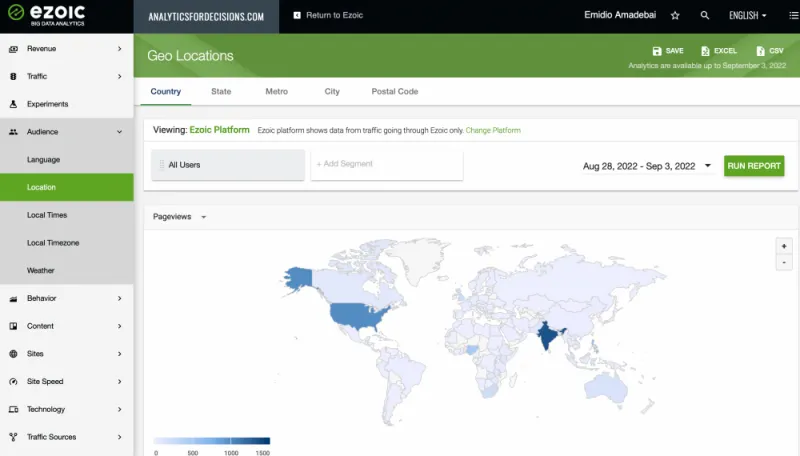When was the last time you bought something because you saw an ad for it in the newspaper? Probably an awfully long time ago because the internet left traditional marketing mediums such as the newspaper or the radio far behind. The reason why the internet has advanced so much is Data Analytics (DA). This technology revolutionized the marketing industry and allowed it to grow, especially back in 2020 when everyone was stuck at home.
The only source of happiness for most of us was online shopping (retail therapy). Since the internet was the only way to stay connected with the world, almost every business owner took advantage of it by promoting their business digitally.
In this article, we will talk in detail about:
- Data analytics and the benefits it brings us
- Digital marketing and how data analytics has helped this sector flourish
- Examples of some of the most prominent tools, features, and applications of data analytics that are being used in digital marketing
What is Data Analytics?
In high-level terms, data analytics is the branch of data science that deals with collecting and interpreting data to retrieve the required information from a dataset. There are algorithms and systems specifically designed according to your needs, and your dataset undergoes multiple processes in order to give you the answers to your questions.
For example, any time you’re asked to fill in a survey on any site regarding a new feature/its service, that site is collecting data related to that feature so that they can determine if the launch of that feature was a hit.
The core steps to leverage data in Machine learning for effective digital marketing
Let us quickly go over the steps and processes that data goes through to give out helpful information to understand how big of a role data analytics plays in making decisions for your company’s future.
When working with a dataset, the first step is to cleanse the data by eliminating redundancies and any misleading information. After this, it is compared with similar scenarios from the past to produce an appropriate conclusion, which is done by utilizing descriptive analytics. Advanced analytics then detects trends in the dataset with the help of various machine learning tools. Ultimately, it provides you with practical solutions and predictions for the future.
Benefits of using data analytics and machine learning in Digital Marketing
Here are some of the numerous benefits of data analytics that push us towards using it:
- Used to predict trends in the market so you can make smarter business decisions
- Provides you with critical information without risking your data
- Helps you understand the needs of your customers
- Allows you to plan out the future of your company by making reliable predictions
- Timely informs you about your company’s weaknesses
What is Digital Marketing and Why Does it Matter?
In 2022 the world has become more dependent on technology and the internet than ever. Almost every sector of business involves some use of technology. Likewise, the marketing sector has also been digitalized. You have probably noticed how nearly every brand now has a social media page or a website through which they can interact with their customers. All of this can be traced back to the 1980s when email was the only means of communication, but now popular brands like Shein or Cider even have their own mobile apps in addition to their websites and social media accounts.
Digital marketing has given company owners a chance to better understand their customers through features such as customer feedback and surveys that allow companies to record customer reactions digitally. Another reason people have shifted towards digital platforms is that there has been a drastic increase in the amount of Big Data that is being collected, and storing it digitally is a far better option.
Importance/Role of Data Analytics in Digital Marketing
Digital analytics allows you to understand the product data collected from several digital sources and align your marketing strategies based on factual data instead of merely following your hunch or natural instincts. Social media companies such as Facebook and Instagram and online streaming apps like YouTube and Netflix collect product data from their users and examine it to develop new and efficient strategies.
In a way, all of these companies keep track of what you do online now; this may start to sound a little scary, but it is not that scary. When you visit a site, you may see a small dialogue box in one of the corners telling you that the site collects cookies or asks you for permission to collect cookies.
Well, those cookies are not your regular cookies; they are like small blocks of information that store your browsing activity (that does not include any of your personal information, of course!).
Now you are probably wondering what these companies do with these cookies. They use the collected data to recommend things similar to what you were looking at to keep you engaged. Cookies are not the only way companies collect data; but there are several other data collection methods. You can get useful information from customer complaints and transaction histories as well.
For Example: When you finish watching a movie on Netflix, you see that a whole new section of recommendations appears with movies that are similar to the one you just finished labeled “Because you watched…”. What happens in the background is that Netflix makes a collection of the top-rated movies from the same category as that of the movie you watched just to keep you hooked.
As you may have noticed, instead of guesswork, companies can now confidently tell which one of their products is growing in popularity and which one is slacking. In addition to that, they can also identify their competition and adjust their prices and products accordingly to lure in new customers.
You can also predict what customers might want in the future and develop strategies accordingly. Another benefit that digital analytics brings you is that it detects the features and sources that bring in new customers, so you know what has been helping you the most. This sort of information is part of the collected website data.
AI, ML and Social Media Trends and Digital Marketing
Advancements in Artificial Intelligence (AI) and Machine Learning (ML) technologies have further improved digital marketing methods. These modern technologies have helped make identifying trends within the data a lot easier. AI Chatbots, or as you know them, “online assistance,” are chat boxes in which you ask questions and are answered in real-time. What happens in the background is that the company collects the data from the chat box and adjusts its products accordingly. Common queries are also added to the frequently asked questions (FAQs), so the chatbots can answer those questions without any supervision.
Social Media has proved to be an excellent platform for digital marketing. With the help of digital analytics, companies have been able to keep up with trends by tracking conversations and feedback. That is how something you were talking about with someone the other day showed up on your explore page today. When people start promoting their business on social media platforms such as Instagram, they are told to add as many “hashtags” in the description box as possible. So that any time some other Instagram user mentions any of the words used, the product lands on their explore page.
For Example: How does Spotify make playlists for you with songs you love? It keeps track of songs you like and avoids songs you often skip. After detecting the trend of the songs you’re into, it adds new songs similar to your interests. Similarly, it produces offers such as “unlimited skips” to convince its users to buy the premium version.
Data Analytics in Google Analytics
Now, if we move on to the applications that help you with digital analytics, one of the top examples is Google Analytics. Google Analytics provides you with all the valuable insights from your website to stay updated with everything going on over there.
Let us go over the steps through which google analytics gives you the required information. Once you visit a website monitored by google analytics, the user’s browsing history for that site will be collected against its “tracking code.” Apart from tracking code, “measurement code” is also generated, against which information such as the source that brought the user to the website, purchases made (if any), etc. All of this is recorded for every “session“, which is the amount of time a user stays on that site. What happens to all of this data? Google Analytics integrates all of this data into various reports that are sent to the website owners. Then the owners can make future business decisions based on the information interpreted.
Google analytics promises to provide you with the best Search Engine Optimization (SEO) services. What is SEO? This process increases the visibility of your website’s content over the internet. This is a vital process because the more people see your site, the more tempted they would be to check it out. As a website owner, all you have to do is sit at home and register while google analytics does all the work for you. Now that is convenient!

Digital Marketing with Ezoic:
Traditional magazines and newspapers have now been replaced with online ones, and an application that helps these digital publishers track customer information is Ezoic. Ezoic is another example of a platform combining data analytics with digital marketing. This twelve-year-old platform allows digital publishers to track and grow by helping publishers keep up with the needs of their viewers. This platform works with the help of various machine learning tools. It is completely user-friendly, so you do not have to worry about facing any difficulty while working with this application.
How does this platform work? Well, that is simple; once you are all signed up on this site, you can start by working on the different layouts for your site and optimizing your publications. Once you’re satisfied with that, you can partner with many of their various ad partners that will spread the word about their publication and increase their revenue. Ezoic is a platform that loves to experiment, so it allows publishers to experiment with different ad combinations with the help of AI tools to increase revenue.
Every time you publish an article, you set a category for that article as well, and Ezoic links your articles to all related categories. Hence, it shows up whenever someone searches for something similar. Ezoic also includes which articles brought you the most revenue in its reports, so it helps you identify what type of content you should focus on more. If you work with multiple content writers, Ezoic also allows you to track which writer’s work is most popular.
I am an EZOIC Premium user, and the ads you see throughout this article are placed by Ezoic, through their machine learning algorithm.
As a blogger with limited content and relatively new sites, EZOIC has clearly stood out among the options to use for putting ads on my sites, and one key reason is their BIG DATA ANALYTICS, which is top of the line even when compared to other premium ad providers out there. Check below a screenshot of the Big Data Analytics environment for this specific site.
If interested, you can go to Ezoic by using my affiliate link and learn more. Full disclosure, I am an affiliate of Ezoic, and should you register and use Ezoic through this link for also monetizing your own website, taking advantage of its AI technology and great ad rates, then I might qualify for a referral commission.

Similar Articles to Read
-

Data Analytics Vs Cyber Security – A Comprehensive Comparison
-

The Importance of Data Analysis in Research
-

11 Reasons Why Data Analytics Is Important in Marketing
Key Takeaways
Data analytics is like a gift that keeps on providing value to every industry; the more advancements made in this technology, the more it helps other sectors evolve. Data analytics has given a whole new shape to digital marketing by allowing sellers to spread the word about their businesses and attract new buyers. Once integrated with other technologies, such as AI and ML, data analytics has taken the marketing sector by storm, encouraging people to move towards digitalization. Thanks to digital analytics, you can promote your business through new and bigger platforms without risking the security of your data.
Throughout the article, we explored the topic in detail along with some real-life examples so you can easily relate to the importance of data analytics in your everyday life. That’s all for today, see you at the next one!



